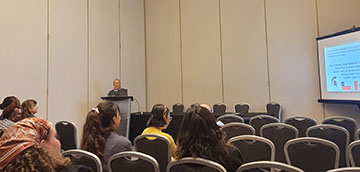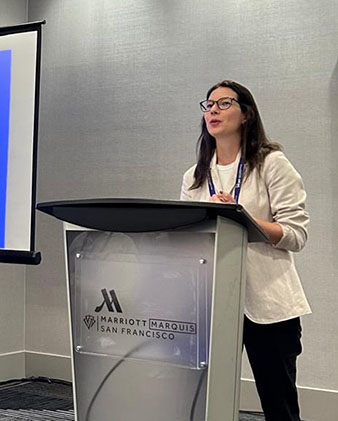Knight Center director Eric Freedman and Knight Center doctoral student and research assistant Iasmim Amiden dos Santos presented two papers on environmental journalism in Latin America at the 2025 Association for Education in Journalism and Mass Communication (AEJMC) conference, held August 7-10 in San Francisco, California.

Eric Freedman presenting at AEJMC
Freedman presented a case study of three Knight Center training programs for professional journalists and students in Bolivia, Chile and Peru. The programs were designed to strengthen skills, expand networks and build knowledge of environmental science and policy, while adapting to each country’s social, political and environmental context.
Freedman also addressed the challenges of conducting training during the COVID-19 pandemic, when the Peru program shifted to a virtual format. Despite those hurdles, Freedman stressed the benefits of these initiatives in improving accuracy, ethics and fairness in reporting – especially in contexts with limited funding for investigative work, restrictions on press freedom and physical or legal threats that undermine journalists’ ability to cover environmental degradation and related social conflicts.
Looking ahead, Freedman pointed to lessons for future programs. These include the need for flexibility – since many participants were freelancers balancing financial pressures with training sessions – finding ways to measure long-term impact and maintaining connections with trainees, news outlets, partners and universities to support ongoing collaborative learning. The study was co-authored with Knight Center research director Dr. Bruno Takahashi, master’s student Julia Belden, Dr. Gisele Souza Neuls and Amiden dos Santos.

Iasmim Amiden dos Santos presenting at AEJMC
Amiden dos Santos presented findings from a study on the roles of journalists working in independent media in Bolivia and Peru. She discussed how these journalists act as decolonial agents, challenging colonial legacies such as extractivism and the oppression of Indigenous peoples. Journalists interviewed for the study reported prioritizing Indigenous voices and worldviews in their coverage, committing to social justice and taking clear positions when facing violence and human rights violations – an approach shaped by the region’s complex colonial history. This research, conducted with Takahashi, was published in Journalism Studies, a peer-reviewed journal for journalism and media research.
Both studies and the training programs received support from the U.S. Embassy in La Paz, Bolivia.
